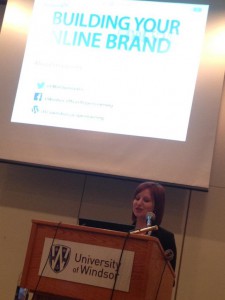Pecha Kucha Presentation- Building Your Online Brand
Campus Technology Day 2015, University of Windsor
One of my roles in discussions of ePortfolios is to describe how they relate to professional promotional tools. I believe that ePortfolios are an important tool in promoting yourself, building professional practice, and indeed building your online brand.
You are what Google says you are, until you get the chance to say so yourself.
In this light, I presented at UWindsor’s Campus Technology Day in 2015 during the Lightning Round, Pecha Kucha style: 20 seconds per slide for 6 minutes total. It was challenging in all the best ways. Visually, I wanted to make it interesting, but the organizers needed me to develop my presentation in PowerPoint, in order to make the session go seamlessly. This is hard for me, since I find PowerPoint incredibly stifling to work with. To get around this, I got the dimensions of the slides and created 21 separate jpegs in Photoshop. This was much more time consuming, but gave me more control over the way my presentation played behind me as I spoke.
Would I do anything differently? Yes. Yes I would. I didn’t take into account that the screen I was working on was wider than the screen my slide deck would eventually be presented on, as well as in the presentation below. My mistake for trying to MacGyver the system.
What did I really like about it? I personally like to develop my talking points first, and then the slide deck after. In this way I was able to put just enough on the screen to make it interesting for the viewer, not too much that they stopped paying attention to me. And I also like to write out my script. It takes longer, but when I’ve only got limited time to cover all the points & there’s no time for questions? It helps me stay on track.
This was a fun presentation to do, I’d recommend Pecha Kucha to any organizing committee!
CRITERIA:
Members strive to be current in their professional knowledge and recognize its relationship to practice. They understand and reflect on student development, learning theory, pedagogy, curriculum, ethics, educational research and related policies and legislation to inform professional judgment in practice.
Examples of:
- evidence of understanding multiple intelligences
- evidence of understanding current views on differentiation
- evidence of understanding diverse curriculum theories
evidence of understanding current legislation and Ministry policies beyond differentiation- Safe schools- bullying,etc. - knowledge of effective instructional strategies
- course work experiences (eg. Assignments, readings, summary of class discussions )
*other documentation
